
Is blockchain technology suited for the maintenance of e-invoice address registries, and can it be used in accounting automatisation? The Federation of Finnish Financial Services brought together a large team of experts to find out. They have now set their sights on building innovative models that test the suitability of blockchain technology as a technical platform for an e-invoicing registry.
The Finnish e-invoicing address registry is a national service that holds information on the companies that send and receive e-invoices. The registry is currently maintained by the Finnish Information Society Development Centre, TIEKE. Companies need the address registry when they want to send an invoice to another company, for example.
“The current e-invoicing address registry was established when the volumes of consumers’ and businesses’ e-invoices began to go up, but the platform is now beginning to approach the end of its service life”, Ilola explains.
Upkeep of the registry needs renovation and further development. Blockchain technology enables the storage of data without a centralised server. The data is simultaneously available to innumerable users around the net, and cannot be tampered with due to the way the blockchain is coded. The best known application of this technology is the virtual currency Bitcoin.
Updating technology
The developing partners include a significant number of banks, system suppliers, authorities and organisations. The project is organised by the Federation of Finnish Financial Services. The participants test whether an e-invoicing address registry can be built on the new blockchain technology.
“The aim of the project is to build an e-invoicing address register that takes into account the potential of modern technology and the wishes of the users. It utilises earlier requirements specifications, such as the requirements analysis done by the Finnish Tax Administration”, Ilola says.
The project was launched in October, and its goal is to have comprehensive specifications and implementation documentation ready by December 2016. The first workshop was held in early November at the FFI, and the work continues until the objectives have been accomplished.